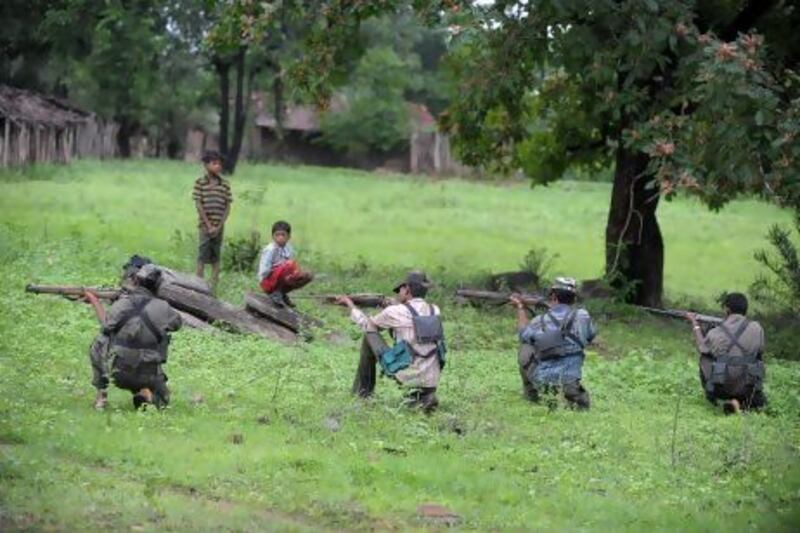NEW DELHI // Differences over the best way to combat the Maoist insurgency have divided the India government and led to splits in the party that dominates the ruling coalition, the Congress.
The insurgency, which has been around for decades, came back into focus last month after fighters killed 27 Congress party workers in Chhattisgarh state. Before the May 25 attack, the Congress-led government had offered peace talks to the Maoists, said the junior home minister of India, RPN Singh, last week.
Yesterday, he said that the time for talk was over.
Maoists are most influential in India's eastern states and have been fighting against successive governments since 1967, when they launched an insurgency based on the ideology of Mao Zedong, the founder of China's communist state. The insurgency has more than 1,900 people over the past eight years in Chhattisgarh alone.
The government said it will hold a meeting on Monday to discuss an anti-Maoist strategy and "resolve this problem forever", said Kamal Nath, the minister for parliamentary affairs.
"The attack in Chhattisgarh was an attack on our democratic system and all political parties must be involved and engaged in the further course of action and the strategy to be evolved," Mr Nath said.
The flood of statements from within the government has revealed different opinions on the most effective methods to tackle the Maoists.
The rural development minister, Jairam Ramesh, was quick to call the Maoists "terrorists" and wanted a heavy police presence in troubled states like Chhattisgarh.
"In south Chhattisgarh, huge areas have been announced as Maoist-liberated zones," Mr Ramesh said in Kolkata last week, referring to areas controlled by Maoists. "No government can accept such liberated zones, and strong security measures will be taken."
Other ministers said the way to solve the problem was through a better understanding of the insurgency. The Maoists did not just constitute "a law-and-order problem", said the agriculture minister, Sharad Pawar.
The root of the crisis lay in economic inequality, which led to discontent among poor tribal populations, Mr Pawar said. "The tribal child living in jungles is not sure of two square meals a day. Some day or the other, he may take a different route. There is a need to understand this."
India's tribal affairs minister, Kishore Chandra Deo, also pointed to the socio-economic factors fuelling the insurgency.
He said the government needed to develop states where the insurgency was the strongest and that by providing better infrastructure, including roads, housing, drinking water, medical care and schools, Maoists would lose support.
Sending in more troops, Mr Deo said, would only bring "worse consequences".
"Air power and the military are meant to fight the enemy and not your own citizens," he said. "It will create a civil-war-like situation."
Mr Deo also denounced the Salwa Judum - an extrajudicial civilian militia created by the government to fight Maoists - calling it "sinful".
At least one part of the government's response to the Chhattisgarh attack has followed Mr Deo's line of thinking.
Last week, the government extended its Integrated Action Plan for Maoist-hit districts for four more years. Every year, about 10 billion rupees (Dh647 million) would be spent in 82 districts to improve infrastructure.
The divergence of views within the government also reflects a similar split among commentators and analysts.
Sushant K Singh, a national security fellow at the Takshashila Institution, a think tank in Chennai, said he believed enhanced security operations "must be the first stage, not the end stage, of dealing with the Maoist problem".
"It is true that the final solution to this problem is political, and development is really the only answer," Mr Singh said yesterday. "But how do you have development without security? How will a school run? How will a primary health centre run?"
Mr Singh pointed to the success of the "Saranda" model, which has been overseen by Mr Ramesh's rural development ministry.
Under the model, 56 villages in the Maoist-hit Saranda region of Jharkhand state were cleared of the rebels through massive military operations and then aggressively developed.
The government provided better housing, roads, radios and bicycles and violence declined.
"The model hasn't met all its targets, but it seems to be the best available model," Mr Singh said. "You hit the Maoists hard first, then you follow up with development."
But Nandini Sundar, a sociologist at Delhi University, said that she did not expect "the government to do anything sensible".
Ms Sundar said she was emphatically opposed to increased paramilitary action, but that she also does not think that further development - "schools and hand pumps" - was the first priority.
What was needed, she said, was for security forces and Salwa Judum personnel to be tried for the crimes they have been accused of committing. These include the rape and murder of villagers as well as the arson of villages.
In 2011, the Supreme Court ordered the Chhattisgarh state government to file criminal charges where required against the Salwa Judum. While 500 allegations of murder, 103 of arson and 99 of rape have been brought forth by citizens, the Chhattisgarh government has not investigated any of the cases.
"When people have died, when houses have been burnt, and when you've been going around killing and raping, I don't think development is an issue at all," Ms Sundar said. "There needs to be an acknowledgement that this has happened. That's the only way to move forward."
[ ssubramanian@thenational.ae ]





